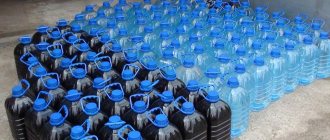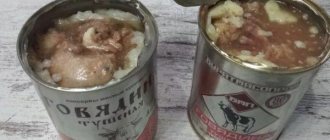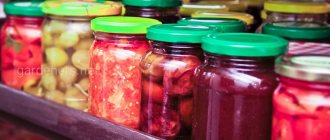Storing ready meals
Many ready-made dishes (broths and first courses in meat, fish or mushroom broth, second courses of meat, poultry, fish, stewed vegetables, mushroom dishes, cold dishes - jellies, jellied meat and fish, vinaigrettes, salads, as well as confectionery with cream) are perishable products.
It should be remembered that first and second courses can be stored in the refrigerator for no more than 72 hours . If dishes are prepared for future use, before serving, only the part that is needed for eating is boiled or heated in a frying pan, since with each boiling and heating the vitamins are partially destroyed. For the same reason, it is not recommended to prepare food for future use in large quantities.
Jellied dishes and jellies are stored in the refrigerator for no more than 12 hours , pastries and cakes (prepared at home or purchased in a store) with egg white whipped cream or fruit finishing - no more than 72 hours , with butter cream - 36 hours, with custard - 6 hours .
Storing meat, fish, meat and fish products
Of the meat and fish products, semi-finished products and by-products spoil most quickly (except for tongue - it can be stored like regular meat).
Recommended shelf life of semi-finished products and offal in the refrigerator
portioned semi-finished meat products (beefsteak, entrecote, languette, etc.) - 36 hours , breaded (schnitzel, rump steak, etc.); small pieces (beef Stroganoff, goulash, stew, etc.) semi-finished meat products - 18-24 hours , cutlets, minced steaks, liver, kidneys, brains, etc. - 12 hours, minced meat, cabbage rolls, peppers, stuffed zucchini meat and rice - 6 hours; semi-finished poultry products: natural fillet - 48 hours, breaded fillet - 24 hours, chopped cutlets, giblets - no more than 12 hours.
Semi-finished fish products breaded in breadcrumbs are stored for no more than 24 hours, fish cutlets - 12 hours.
Recommended storage times for meat, poultry and fish
At temperatures from 0 to 8 ° C, fresh and chilled meat and poultry are stored for up to 72 hours , fish - 48 hours ,
By placing frozen meat, fish or poultry in the freezer, you can significantly extend their shelf life. If defrosted, regardless of subsequent storage conditions, meat, fish and poultry must be used within 24 hours.
Recommended storage times for sausages, hams, and smoked meats
The shelf life of sausages, cold cuts, hams and smoked meats depends on the method of their production.
Boiled sausages
Boiled, stuffed, liver, blood sausages, sausages, wieners, boiled ham, boiled pork, etc. at home are stored only in the refrigerator at a temperature of 0-8 ° C. At the same time, boiled premium sausages, boiled ham, boiled pork, roll pieces (not cut) can be there for 72 hours , boiled sausages of the 1st, 2nd and 3rd grades, sausages, sausages, liver and blood sausages and brawns of the 1st and 2nd grades - 48 hours , liver sausages, blood sausages and brawns of the 3rd 1st grade - no more than 12 hours.
Raw smoked, cooked-smoked and semi-smoked sausages
Semi-smoked and cooked-smoked sausages are stored at room temperature (not higher than 20°) for up to 3 days, in the refrigerator at a temperature of 0 to 8° C - for 10 days . The same period is acceptable for smoked meats (smoked rolls, ham, brisket, etc.).
Raw smoked sausages placed in a cool, dry place can be stored for a long time .
Raw smoked, boiled-smoked and half-smoked sausages , like other smoked meats, cut into slices and vacuum-packed in plastic film, are stored at temperatures up to 20 ° (without opening the package) for up to 4 days , in the refrigerator - up to 6-7 days.
Storing milk, dairy products and eggs
All dairy products are best stored in the refrigerator.
Fresh milk in any container - no more than 36 hours , boiled milk - up to 3 days. , lactic acid products (kefir, yogurt, acidophilus) up to 36 hours , sour cream - up to 3 days. , cottage cheese and curd cheeses - 36 hours , sweet cream cheeses in polymer packaging - up to 48 hours .
Butter can be stored in the refrigerator at temperatures above 0° for up to 10 days , in the freezer - for a longer time, cheeses - up to 15 days, chicken eggs - up to 20 days.
What can you wrap certain foods in?
The modern market offers us many ways to store products, when it comes to wrapping paper, films, and sealed containers. However, arbitrary use of various types of packaging is not always acceptable
. For example, some foods should be wrapped in foil, while others are better stored in paper wrappers.
Marcin Jucha
What can be stored in film and plastic bags
For preservation in cling film and plastic bags, use more vegetables and fruits, various smoked meats, hard cheeses, lean fish and meat. Very fatty foods should not be wrapped in film.
. In any case, if you cut a portion of the product, it is recommended to wrap it in a new layer of cling film for further storage.
What can be stored in foil
Foil packaging is great (and, by the way, is actively used almost everywhere) for storing already prepared foods
nutrition. It’s especially good to store fatty foods in it - if you pack it well, they won’t leak or get stained with grease.
What can you store in parchment paper?
Parchment paper, like cling film, is suitable for storing smoked meats, meat products, and hard cheeses. In some cases, paper is even better than film, because the former allows air access
(paper, after all, “breathes” better than film). You can also wrap cottage cheese and butter in it. But parchment paper is not suitable for storing vegetables and fruits, as well as fish.
What can be stored in plastic trays
Plastic trays are suitable for storing any food products that cannot be affected by food grade plastic
. In other words, if you want to pour some kind of “aggressive” sweet and sour sauce into a container, it is better not to do this, as it is more likely to react with the plastic.
Storing vegetables, fruits and berries.
Storing vegetables, fruits and berries without refrigeration
At home, at room temperature, ripe vegetables, fruits and berries spoil relatively quickly.
Usually, after 12-24 hours, berries begin to sour, especially strawberries, wild strawberries and raspberries; Tomatoes and food herbs rot quickly.
Ripe apples, pears, and oranges for 2-3 days at room temperature in the absence of damage .
Washed vegetables and fruits rot after 6-12 hours.
Root vegetables (potatoes, beets, carrots) can be kept at room temperature in a dry place for up to 10-14 days . But beets and carrots can dry out, losing their taste and vitamin value. In a warm room, potato tubers can germinate, which is accompanied by an increase in the content of the toxic substance solanine, which can cause severe poisoning.
Ripe watermelons, melons, and pumpkins can be stored at room temperature for 10 days or more if their skin is free of abrasions and damage; Melons spoil faster.
Onions and garlic can be kept in a dark, dry place at room temperature for 1 month. and more .
Storing vegetables, fruits and berries in the refrigerator
You can store vegetables and fruits for a long time in urban conditions only in the refrigerator at a temperature of 0-2 ° C.
For storage in the refrigerator, vegetables and fruits of good quality are selected, without damage to the surface, not limp, not frostbitten. They should be clean (but not washed) and in a container with a lid or in a plastic bag.
The shelf life in the refrigerator for most vegetables and fruits has not been established, but they should be checked regularly: if areas of softening, spots on the peel and other early signs of spoilage appear, it is not recommended to store them longer. It is also not recommended to keep berries and food greens in the refrigerator for more than 24-48 hours.
Storing vegetables, fruits and berries in a cellar (special room)
In a country house, vegetables and fruits can be stored much longer if there is a special room and constant temperature and humidity.
After harvesting on a personal plot, fresh vegetables are placed in cellars and undergrounds. In order for vegetables to be preserved during the winter, the temperature in the storage room should be 0-2°. At 5° some vegetables begin to sprout and spoil.
You need to especially watch out for potatoes: they need to be kept in a cool, dark room, out of direct sunlight.
It is better to store fruits (apples, pears, etc.) separately from vegetables, as they quickly absorb foreign odors and change taste. The best conditions for fruits: temperature from + 2 to 0°, relative humidity in the range of 85-95%, regular supply of fresh air.
How to dispose of goods that have passed their sell-by date?
Working with expired goods begins with identifying options for its further use. For this:
- The owner contacts Rospotrebnadzor to conduct an examination of the product. You can familiarize yourself with the list of goods that are considered unsuitable for use after the expiration date in Decree of the Government of the Russian Federation of June 16, 1997 No. 720. The assessment procedure itself is regulated by the following regulations:
- paragraph 2 art. 3, Art. 25 Federal Law dated January 2, 2000 N 29-FZ;
- clauses 2, 3 of the Regulations.
- Based on the results of the inspection, the authorized body issues a conclusion that the product can be disposed of.
- The specific permission depends on the further intended use of expired products. For example, for the processing of raw materials into animal feed, an appropriate conclusion is issued signed by a representative of the veterinary supervision.
- Until disposal, all expired products must be stored in strictly designated areas. Storage containers must fully comply with sanitary requirements: be airtight.
- Disposal is carried out by a specialized company. This company must have a license from Rospotrebnadzor to carry out activities for the disposal of a specific type of waste (Article 9 of the Federal Law “On Production and Consumption Waste” dated June 24, 1998 N 89-FZ). In accordance with the law, products must be removed for disposal in a timely manner.
- The company removes expired products from the plant to a processing site.
- Based on the results of the examination, the products are processed either into animal feed or secondary raw materials.
- The owner of the product is obliged to notify the authority that issued the disposal permit that the product has been transferred to the appropriate company for further use. This must be done within 3 days after the product is transferred to the recycling company. Notification is carried out by providing the original document confirming the transfer, or its notarized copy. (Clause 16 of the Regulations).
The procedure for disposing of expired goods is accompanied by the execution of certain documents. They are necessary to confirm the disposal, as well as for accounting reporting.
The list of documents includes:
- Primary documentation (approved by the company independently). Includes, for example, an inventory list of inventory items (Form No. INV-3), an act of damage to goods (Form TORG-15 or independently developed by the company).
- Documents confirming the transfer of products to the recycling company (documented as sales by waybills, acceptance certificates).
- An act on the transfer of goods to a specialized company and on its further processing (the document is submitted to Rospotrebnadzor).
Basic food processing methods
- Production of animal feed . As a rule, expired products are processed into compound feed. In some cases, no processing is required and the product can be sent directly to the animal shelter.
- Production of jams, vinegars . Expired, rotten organic products are suitable for this. They undergo special processing.
- Biological processing (composting) . Its goal is to achieve natural decomposition of products. To do this, they are placed in tightly closed containers. There, the goods are composted at the temperature required for decomposition. In the future, the processed raw materials can be used in industry and agriculture.
Destruction procedure
The general procedure is the same as for disposal. With the difference that at the end of the process the product will not be processed, but destroyed. This can be done either independently or by contacting a specialized company.
The procedure will be as follows:
- Identification of expired products.
- Applying to Rospotrebnadzor to conduct an examination of the product (clause 8 of the Regulations).
- Making a decision on the unsuitability of products and the need for their destruction (clause 10 of the Regulations).
- Direct destruction of products.
- Submitting the Destruction Certificate to Rospotrebnadzor within 3 days after the procedure.
The legislation does not regulate the specific performer of the goods liquidation procedure. It is only required that the destruction be carried out in compliance with the mandatory requirements of regulatory and technical documents on environmental protection (clause 17 of the Regulations).
In this case, the destruction of overdue payments occurs in the obligatory presence of a commission . It consists of representatives of the company that owns the goods, as well as the organization responsible for the destruction (if it is carried out by a specialized company).
If products are destroyed, the elimination of which may lead to the spread of diseases or poisoning of people and animals, or environmental pollution, a representative of Rospotrebnadzor must be present at the procedure. Subsequently, he is obliged to sign an act of destruction. (Clause 6, Article 25 No. 29-FZ “On the quality and safety of food products”).
Despite the fact that the law allows for the independent destruction of expired goods, it is considered most appropriate to contact a specialized company.
In this case, the owner will not have to worry about the rules for the destruction of certain types of products or their proper storage.
A cooperation agreement is concluded with the recycling company . The company itself picks up the goods and takes them to the place of destruction. The company carrying out the liquidation of products must be accredited.
During the destruction of expired products, reporting documents are also drawn up. These include:
- Primary documentation.
- Product disposal act.
The exact requirements for the content of documents depend on the type of product. Thus, the destruction of food and perfumery and cosmetic products is formalized by an act of write-off of goods in form No. TORG-16. It is drawn up in several copies (according to the number of commission members) and signed by all its members. The composition is approved by the director of the organization. May include company employees, representatives of the recycling company and Rospotrebnadzor (if necessary).
Ways to dispose of products
- Burial in a landfill . The most non-ecological method. The products are taken to a special place and stored there.
- Burning . The goods are placed in special ovens - crematoria and burned there. The resulting ash can later be used as fertilizer.
We also recommend reading other materials from our experts. From them you will learn what sellers do with expired goods and what products can be eaten after the expiration date, what liability is provided for the sale of expired goods and what to do if you find or buy an unusable product.
Thus, if goods have an expiration date, the seller is obliged to carefully monitor the period of delay. Expired products cannot be sold and must be recycled or destroyed. These are 2 fundamentally different procedures, the implementation of which allows the owner to legally get rid of illiquid products.
If you find an error, please select a piece of text and press Ctrl+Enter.
Canned food storage
Sterilized factory-made canned goods, as well as those prepared at home in hermetically sealed jars, can be stored for a long time at normal temperatures. You cannot keep canned food at elevated temperatures (in hot rooms, near heating devices, etc.).
Canned fruits - preserves, jams, juices, syrups - darken and change color in a hot room; canned food in unvarnished tins acquires an unpleasant, metallic taste.
Do not allow canned food to freeze. With subsequent defrosting, their taste significantly deteriorates, especially of canned vegetables and fruits, the purees separate, syrups and marinades become cloudy, vegetables and fruits become flabby and tasteless.
Storing canned foods with a high sugar content (jams, jams, condensed milk, etc.) at low temperatures leads to their sugaring. Freezing canned food is also undesirable because it increases the volume of the contents, and this leads to the expansion of cans, swelling of the lids, divergence of the seams, and the lids of glass jars may break off.
Store canned food in a dry place.
Unsterilized canned food in tin and glass jars - the so-called preserves - require special attention. As a rule, these are fish snack products - marinated herring, capelin, sprat, etc. They are stored at a low temperature, but not below 0°. In hot weather, if there is no refrigerator, they should not be stored for more than 2-3 days. The storage conditions and periods for preserves are usually indicated on the label or lid of the jar.
Once opened, a canned product cannot be stored longer than the same product that has not been preserved.
For example, after opening the can, the recommended shelf life of condensed milk in the refrigerator at a temperature of 0 to 8°C should not exceed 72 hours, canned meat - up to 48 hours, etc. Canned meat, fish and vegetables should be immediately transferred from cans in glass or enamel containers.
Accounting and sales of products. Dealing with damaged goods
Product labeling will help keep records of goods in the warehouse.
When selling, use the principle: the first to expire is the first to go, that is, the product that becomes unusable first is consumed first.
Products that have expired are written off and disposed of. Products with damaged packaging are also destroyed. SanPiN or Pantry will tell you the rules for recycling each type of food waste, but a little later.
Some expired goods, with the permission of state control authorities, can be sold at reduced prices, for example, as animal feed, an additive for the production of cement or for making jams.
Dry food storage.
Flour, cereals, pasta, dried fruits, granulated sugar can be stored for quite a long time, while observing certain rules.
Dry bulk products are kept in dry, well-ventilated areas
An increase in the amount of moisture in products over 15% contributes to their spoilage. Products are moistened in unventilated, basement areas, as well as during sudden temperature fluctuations.
Dry foods can be stored in paper bags, linen bags, and also in special jars with lids.
To prevent the taste of dry products from deteriorating (millet rancidity, the appearance of various pests, etc.), you should not make large reserves, renewing the products as you use them.
Dry products easily perceive and retain foreign odors for a long time, which should also be taken into account when storing them.











